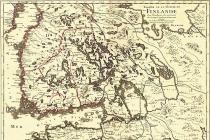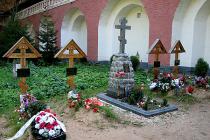The struggle between Moscow and Tver for leadership over Northern Russia took place against the backdrop of the strengthening of the Principality of Lithuania. Prince Viten was able to defeat his rivals and subjugate the tribal nobility. He bought Polotsk from the German knights. Vytenya was killed by his own commander Gediminas (some sources call him Vytenya’s son or brother), who continued the policies of his predecessor. His squads easily captured the disintegrated Turov-Pinsk principality. Gediminas married the son of Olgerd to the daughter of the Vitebsk prince; when he died, Vitebsk went to Gediminas and Olgerd.
At this time, the “Russian Kingdom” of the Galician-Volyn prince Yuri Lvovich collapsed. “King” Yuri Lvovich actively participated in the wars of the Western rulers, wasting in vain the already undermined forces of southwestern Rus'. Yuri was succeeded by his sons Andrei and Lev. Gediminas quickly won over Andrei, marrying his daughter to his son Lyubart. Lyubart Gediminovich (converted to Orthodoxy under the name Dmitry) received an inheritance - the prince of Lutsk and Lyubar (East Volyn). As a result, he became the last ruler of the unified Galician-Volyn principality.
The strengthening of Lithuania and the strengthening of the positions of Western powers in the Galician-Volyn principality worried Uzbek. Southern Rus' paid him tribute, and he was not going to give it up. Therefore, he continued his policy of establishing order in Northern Rus'. Here Metropolitan Peter helped him. By the royal will, the Metropolitan agreed on the marriage of the youngest son of the murdered Tver Prince Mikhail, Konstantin, with the daughter of Yuri of Moscow. This marriage was supposed to stop the blood feud between Tver and Moscow.
However, Yuri Danilovich himself found himself in a difficult situation. From his first marriage he had only a daughter. Agafya-Konchak's second wife was poisoned. The church at that time was categorically against a third marriage. In addition, Uzbek, by punishing Tver, weakened it, the political goal was realized. Yuri of Moscow was no longer of interest to the Horde ruler. Now, according to the “divide and conquer” strategy, Tver should have been supported. This was to restore the balance of power.
Tsar Uzbek, having first played along with Moscow, now made a turn in the opposite direction. He took Dmitry Mikhailovich under his protection. The new prince of Tver was not going to put up with Yuri of Moscow, whom he considered the main culprit in the death of his father. He was a very tough man - the chronicles report his nickname Animal Eyes. Later the nickname was softened somewhat - Terrible Eyes. Sensing the political turn in Sarai, Dmitry immediately perked up and wanted to avenge his father and return the Vladimir table. The Tver boyars resumed their political game in the Horde.
At the same time, Uzbek decided to involve Lithuania in his game. In 1320, Tver, fulfilling the will of the Horde king, sent matchmakers to Lithuania. Unmarried Dmitry seemed to Uzbek a good candidate for the implementation of his plans. Dmitry took Gediminas' daughter Maria as his wife. There was great joy in Tver. Dmitry was in honor of the khan and established an alliance with Lithuania.
For Yuri, things were getting worse. In 1320, his brother Boris, who was the prince of Nizhny Novgorod and Gorodets, died. In order to leave the inheritance under the rule of the Danilovichs, Yuri sent Ivan Kalita to Sarai. However, Uzbek thought differently; he did not want Nizhny Novgorod and Gorodets to join Moscow, of which Ivan was the prince. He did not give a label and left Ivan with him to evaluate the Moscow prince.
The situation for Yuri was complicated by the fact that, having temporarily pacified Rus', Uzbek wanted to restore order in taxation. But the problem turned out to be too advanced and virtually impossible to implement within the old framework. It was impossible to pay tribute in the previous volume. The Yaroslavl, Rostov, Suzdal, Belozersk, Ryazan lands broke up into destinies, which were severely devastated and continued to be subject to regular devastation. People from these lands began to leave for safer territories, protected by distance, forests and swamps. They went to Moscow, Tver, Novgorod lands. And the size of the Horde exit for these territories was determined at an early time. Debts grew. Uzbek, demanding payments, sent “embassies”, essentially punitive expeditions, to Russian lands. The “fierce ambassadors,” extracting arrears, went on a rampage, which only intensified the flight of people. The result was a vicious circle.
The Uzbek also put pressure on Grand Duke Yuri. Ambassador Baidera, who committed outrages in Vladimir, arrived to him. However, Yuri could not rectify this situation. He was more of a warrior than a business executive. Previously, Ivan was in charge of economic and financial issues, but now he was no longer around. In Rostov, residents were tired of the outrages and rebelled, driving out the “evil Tatars.” This angered the Horde king; he began to think that Yuri was not coping with his responsibilities.
In 1321, in Kashin, the appanage of the Tver prince, the Horde collected tribute, but were unable to extract everything. They complained to the Grand Duke. Yuri decided that this was a good opportunity to cut short his opponent. He gathered an army and marched to Tver. Dmitry Animal Eyes led the army out to meet them. The troops again faced each other on the banks of the Volga. There was no battle. Yuri did not want a battle, it was a demonstration. Dmitry was afraid to be the first to enter the battle; the Muscovites carried out the Horde’s will. An agreement was made. Tver recognized the power of Yuri Danilovich and paid the Horde debt - 2 thousand rubles. Yuri Moskovsky, instead of immediately taking the Tver tribute to the Golden Horde, took it to his brother in Veliky Novgorod and put it into circulation through merchants, planning to make additional profit. This was another step that angered the Horde khan. In addition, in the Horde itself, the pro-Moscow party represented by Kavdygai was defeated. Patron Yuri Kavdygai had strong opponents who got him hooked. They sang to the Uzbek that Kavdygai and Yuri had slandered the late Tver prince. The Uzbek ordered the arrest of Kavdygay, he was put under investigation and then executed.
Yuri was also drawn into this struggle between the Horde factions. With the help of the Tver boyars, a denunciation was prepared against Yuri. He was accused of underpaying tribute and pocketing some for himself. Whether Uzbek believed it or not, it is impossible to say. But he was already dissatisfied with Yuri. I wanted to bet on Dmitry. Denunciation made it possible to legally remove an unnecessary figure. At the end of 1321, Uzbek sent the army of the “fierce ambassador” Akhmyl to Rus'. He plundered Nizhny Novgorod, Yaroslavl was burned for debts, and its inhabitants were sold into slavery. Rostov was able to pay off with rich gifts. Akhmyl conveyed to Yuri the king’s order to immediately appear in the Horde, transfer the great reign to the Tver prince, and Moscow to his brother Ivan. Kalita returned home at this time and warned his brother that things couldn’t get worse.
Yuri was not a fool. He did not put his head on the chopping block himself. In order not to look like a rebel, he respectfully wrote to the khan that, of course, he would arrive soon, but on the western border the situation had worsened, it was necessary to solve the problem, and at the same time collect money from the Novgorodians. Yuri knew Horde politics well. We had to bide our time, and the situation would change. The Uzbek will cool down. Dmitry will do something wrong.
Therefore, Yuri headed to Veliky Novgorod. There, in 1322, he went with the Novgorodians against the Swedes and besieged Vyborg. They could not take the well-fortified fortress either by siege or by storm, but they killed many Swedes, ravaged the surrounding area, and took rich booty. Yuri decided that he could go to the Horde. However, the prince and the Novgorod caravan were intercepted along the way by the brother of the Tver prince Alexander. The Tver ambush suddenly attacked the caravan and captured rich booty. Yuri with a small detachment was able to leave and returned to Novgorod.
The year was very active for Yuri. He prevented a war between Pskov and Novgorod. In 1323, Yuri, expecting a retaliatory strike from the Swedes, founded the Oreshek fortress at the source of the Neva. In the same year, Yuri and the Novgorodians concluded an agreement on “eternal peace” with the Swedes. In 1324, Yuri led the Novgorodians against the Ustyuzhans. They laid claim to the Novgorodians in the North, rich in furs and silver, and were able to intercept the Novgorod tribute collectors. Rich spoils from the Yugra land came to Veliky Ustyug. Yuri was able to take the city with a sudden blow. The residents of Ustyug were forced to compensate for losses and admit that the northern regions and the Urals belonged not to Ustyug, but to Novgorod. Yuri received a substantial share and again moved to the Horde, now in a roundabout way, through the Kama.
It should be noted that Yuri Danilovich’s hopes for political changes in the Horde were fully justified. Dmitry Groznye Ochi was unable to improve the situation with the collection of tribute. And his marriage to a Lithuanian woman did not bring political benefits. Gediminas led an active attack on Russian lands. In 1323, the rulers of the Galicia-Volyn principality Andrey and Lev Yurievich were defeated by Gediminas in the battle of Vladimir-Volynsky and died (according to another version, in the battle with the Tatars). The Poles began to fuss, tidying up Russian lands. After the death of Andrei and Lev, the throne was formally taken by Vladimir Lvovich - the only son of Lev Yuryevich, the last representative of the Rurik dynasty on the Galician-Volyn throne in the male line. In fact, the boyars led by Dmitry Detko ruled. The boyars decided to call Yuri-Boleslav Troydenovich, the son of the Mazovian prince, to the throne. Gediminas did not fight with the Poles; he preferred to conclude an agreement on the division of territories, and a military alliance against the German Order and Horde.
Southern Rus' was falling apart literally before our eyes. Gediminas captured one city after another. Some were taken by storm, others surrendered on their own. At the end of spring 1324, the Lithuanian army moved to Kyiv land. Having taken the Ovruch fortress, the Lithuanians approached Zhitomir, which also fell after a short siege.
The Kiev prince Stanislav Ivanovich (according to other sources, his name was Svyatoslav) gathered troops, which included detachments from South Pereyaslavl, Lutsk, Bryansk, and the Horde regiment. A fierce battle took place on a field near the Irpen River. The battle was stubborn, the Russian-Horde forces fought to the death. Then Gediminas, at the head of his squad, was able to launch a flank attack on the Russian army, which caused chaos and allowed him to turn the tide of the battle in his favor. Oleg Pereyaslavsky and other princes fell in battle. Stanislav Kyiv was able to escape and left for the Ryazan land, without defending Kyiv. The ancient Russian capital resisted for some time, but then capitulated. Gediminas took the title of “Grand Duke of Lithuania and Russia.” Along with Kiev, Lithuanian troops also captured Pereyaslavl, Putivl, Vyshgorod, Kanev and Belgorod.
It is clear that Uzbek did not indifferently watch as his lands were seized by all and sundry. In 1325, he raised troops, called squads of Russian princes and threw them into the Principality of Lithuania. Lithuania was thoroughly destroyed, dozens of settlements were burned, and a huge population was taken. Gediminas made concessions and established dual power in the territories he captured. They recognized Gediminas as their sovereign, but still paid tribute to the Horde.
In such a situation, Yuri arrived in Sarai in 1325 and began to seek the right to the great reign of Vladimir. Tver Prince Dmitry Mikhailovich Terrible Eyes also arrived in the Horde. However, the Horde king, as was his custom, was in no hurry to resolve the dispute. I delayed and delayed this decision. The impatient, hot-tempered prince of Tver finally could not stand it and decided to take revenge personally. On November 21, 1325, on the eve of the anniversary of his father’s death (November 22), Dmitry waylaid Yuri on the way to church and dealt him a fatal blow with a sword.
Whether this murder was in a fit of rage, or the end of a cold plan, is unknown. In any case, the Uzbek was not going to close his eyes to him. He no longer needed Dmitry. Firstly, the Tver prince imagined too much about himself; killing in the Horde could only be done with the permission of the khan. Secondly, the idea of strengthening relationships through Dmitry’s marriage did not justify itself. Lithuania became a serious enemy of the Horde, encroaching on its lands. Khan ordered Dmitry to be arrested, and Yuri’s body to be sent to his homeland and buried there as a legitimate prince.
In Moscow, Yuri was mourned. He was loved in the Moscow land, he defended his principality and expanded it. Metropolitan Peter personally performed the funeral service for Yuri, summoned the Archbishop of Novgorod and the bishops of Rostov, Ryazan and Tver. By this time, Moscow had actually become the residence of the metropolitan.
Meanwhile, there was a menacing calm in the Horde. The Uzbek drove the Tver prince to his headquarters for as much as 10 months. I was wondering what to do with it. Did you think it might come in handy? I looked at Lithuania’s behavior. Finally the verdict was reached. On September 15, 1326, Dmitry Mikhailovich was executed. Together with him, Prince Alexander Novosilsky was executed - either he was a friend and accomplice of Dmitry, or for another crime.
 The reign of Alexander Mikhailovich and the uprising in Tver
The reign of Alexander Mikhailovich and the uprising in Tver
Khan called to himself candidates for the great reign: Alexander Mikhailovich (son of Mikhail Tverskoy and brother of Dmitry) and Ivan Danilovich. The choice fell on Alexander. The Uzbek believed that after the death of his father and brother he would curry favor especially zealously. In addition, he had a plan to place a strong Horde detachment in the Tver land, near the Lithuanian borders. If there was a threat in the south, where the main Horde troops were stationed, this detachment, together with Russian squads, was supposed to deliver a strong blow to the Lithuanian rear.
Alexander's position was deplorable from the very beginning. He incurred debts in the Horde, taking money from moneylenders to bribe the khan's entourage when he was fighting for the label. He returned to Tver with a crowd of money lenders. The prince, wanting to pay off this greedy horde, gave them the markets, duties, taxes, and trades. The residents of Tver were robbed clean, and in the princely villages, children and girls were taken to pay off the debt. But this was only the beginning of the troubles of the Tver land. In the summer of 1327, a Horde detachment led by a relative of Uzbek Chol Khan (in Russian sources, Shchelkan) showed up in Tver. The soldiers were stationed in Tver. Chol Khan's warriors did not take the townspeople into account and committed "a great persecution of Christians - violence, robbery, beating and desecration." There was even a rumor that the Horde wanted to kill the Tver princes and would rule Tver themselves, and the population would be converted to Islam. The atmosphere in the city quickly became tense. A spark was enough for an explosion to occur.
The reason for the uprising was the attempt of the Tatars from Chol Khan’s retinue to take away the mare from a certain deacon Dudko. He began to call people for help. The Tverites rushed at the Horde, the first killed and wounded fell. Comrades came running to the Tatars to help. The alarm bell rang. The townspeople rushed to the square, grabbing. The revolt was led by the boyars Borisovich, Tysyatsky and his brother. A bloody battle began to boil on the streets of the city. The prince, apparently, was not the organizer of the uprising, as some historians assumed; it would have been suicide. But he couldn’t stop him either. Chol Khan with the remnants of the detachment locked himself in the princely residence. The palace was set on fire and all the Horde members died. In Tver, not only soldiers were killed, but also moneylenders and Horde merchants. Only the shepherds who grazed the herds outside the city were saved. They fled to Moscow. Kalita sent them with guards to the Horde.
Should Ivan be condemned for this? This is not reasonable. All Russian lands had scores to settle, old and new, with each other. Many people hated the Horde, but there was no single force capable of resisting the Horde. It was obvious that a moment of violent freedom would be followed by cruel punishment. There was no point in dying along with Tver.
An Uzbek, having learned about the death of a relative and a detachment, “roared like a lion.” The Horde suffered a massacre of Russians, which affected many merchants, artisans and slaves. They killed the Ryazan prince Ivan Yaroslavich, who arrived in the Horde at this inopportune moment. Having learned that not all of Rus', but only Tver, had rebelled, the Horde king cooled down somewhat. He summoned several princes, including Ivan Kalita and Alexander of Suzdal. Large-scale military preparations were underway in the Horde, 5 tumens were assembled - 50 thousand warriors. The army was led by Temnik Fedorchuk. Squads of Russian princes also joined the Horde army.
Alexander could lead his subjects and die in an unequal battle, he could, like his father, go to the king to confess, buy the forgiveness of Tver at the cost of his life. However, he chose to flee to Novgorod and then to Pskov. And his brothers Konstantin and Vasily fled to Ladoga. Tver was left without defenders. There was actually no battle; some resisted scatteredly, others tried to hide. Both cities of the principality - Tver and Kashin - were destroyed, and the land was devastated. Those Tver residents who were not killed were taken into captivity.
The Russian regiments participating in the campaign saved thousands of people who were taken as prisoners to their lands. It must be said that other lands through which the punitive forces passed were also seriously damaged. The Nizhny Novgorod, Kostroma, Rostov, and Novgorod villages suffered greatly. Torzhok was taken and its surroundings were devastated. The Novgorodians assured that they did not have Tver princes, and paid the Horde 2000 hryvnias of silver and gave many gifts to their leaders.
It must be said that thanks to the one-sided coverage of these events by some historians, Kalita looks almost worse than Uzbek. But it was not he who got into debt in the Horde. Not a Moscow prince, he could not control the behavior of the Horde warriors and his own subjects. It was not Ivan Kalita who abandoned his subjects. However, he did everything to ensure that the rebellion of the doomed did not result in a new invasion and bloody war.
In 1328, the Uzbek gave the label to Tver to the younger brother of the fleeing Alexander, Konstantin. He gave the label to Kashin to the third of the brothers, Vasily. The main political consequence of the defeat of Tver was the reform of power carried out by Uzbek. He decided not to transfer supreme power over the Russian lands to one prince. Instead of one Grand Duke, the Khan appointed two. Prince Alexander of Suzdal, in addition to his principality, received Vladimir, Nizhny Novgorod and Gorodets. Veliky Novgorod, Kostroma, and Pereyaslavl came under the rule of Ivan Kalita. He also received half of Rostov. The local princes became completely impoverished and could not pay tribute. The Uzbek believed that the Moscow prince, who had well established economic and financial affairs in his lands, would correct the situation. Kalita did not refuse and immediately “bought” three more principalities - Uglitsky, Belozersk and Trans-Volga Galich. He assumed the debts of the local princes, undertook to pay arrears to the Horde for them, and for this he received power. The Uglitsky, Belozersk and Galician princes became the “helpers” of Ivan Kalita. The long process of creating a new core of the Russian state began.
Soon after Alexander Mikhailovich received the label for the great reign, Uzbek Khan sent his cousin, Baskak Chol Khan (Shevkal, Shchelkan Dyudentevich) to Tver with a Tatar detachment. By sending him, the Horde Khan wanted to put the Grand Duke under his control. The strengthening of Tatar-Mongol rule in Rus' was a response to anti-Tatar uprisings in Russian lands in the 20s of the 14th century. He settled in the principality's palace, driving Alexander out of there. “The lawless Shevkal, the destroyer of Christianity, went to Rus' with many Tatars, and came to Tver, and drove the Grand Duke out of his court, and he settled in the Grand Duke’s court, full of pride and rage. And he created a great persecution of Christians - violence, robbery , beating and abuse." There was even a rumor (in itself fantastic, but characteristic of the state of mind) that Chol Khan was going to kill the princes and sit on the Tver throne himself, and convert the Russian people to Islam; supposedly this was supposed to happen on the Feast of the Assumption. The oppression to which Chol Khan subjected the Tver population caused mass indignation, which resulted in a large popular movement. The patience of the Tver residents was at its limit. Wanting to avoid complications, Grand Duke Alexander ordered them not to resist. But the people could not endure Chol Khan’s oppression any longer and only waited for a convenient time to revolt.
On August 15, 1327, “early in the morning, when the auction was going to be held, a certain Tver deacon, his nickname was Dudko, took a young and very fat mare to drink water to the Volga. The Tatars, seeing her, took her away. The deacon was very upset and began to yell: “People of Tver, don’t hand him over!” And a fight began between them. The Tatars, relying on their power, used swords, and people immediately came running, and indignation began. And they rang all the bells, became a veche, and the city rebelled, and all the people immediately gathered. And a rebellion arose, and the Tver people called out and began to beat the Tatars, where they would catch someone..." Chol Khan and his retinue tried to defend themselves in his residence, the princely palace, and were burned alive along with the palace; All the Tatars who were in Tver were killed, including the “besermen” - Horde merchants. And only the shepherds who grazed horse herds in the vicinity of Tver, taking advantage of the fastest horses, rode on them to the Horde and Moscow, bringing there the news of the murder of Chol Khan.
Some chronicles (outside Tver) show Alexander as the initiator of the uprising; but, according to modern historians, Alexander could not possibly have been the initiator of a clearly suicidal uprising; however, he took no measures to calm the crowd.
Having learned about this, the Moscow prince Ivan Kalita realized that his time had come, and rushed to the Horde - to destroy the rebellious Tver with someone else's hand. From there a formidable wave of punitive expedition was already rolling in, led by five temniks, and their governor was Fedorchuk. Moscow forces also joined it. “Fedorchuk’s army” was the most terrible in several decades. The army of the Moscow prince, which included up to 50 thousand Tatars, occupied Tver and Kashin. Cities were devastated, and the population was subjected to mass executions. The uprising in Tver was literally drowned in blood.
"Fedorchuk's army" suppresses the uprising in Tver
Taught by the bitter experience of his father and brother, Prince Alexander did not want to appear in the Horde for reprisals and, “in order not to endure godless persecution, leaving the Russian grand-ducal throne and all his hereditary possessions, he went to Pskov with the princess and children and remained in Pskov.” With the consent of the khan, his brother Konstantin Mikhailovich sat in the place of the Tver prince. But the bread of an exile is bitter. Having tasted it enough and believing that the anger of Uzbek had already subsided, in 1337 Alexander sent his son Fedor to the Horde, and soon he himself arrived there. He honestly and openly told Uzbek: “I have done a lot of evil to you, but now I have come to accept death or life from you, being ready for everything that God will tell you.” The khan liked these words, and he said to his entourage: “Prince Alexander, with humble wisdom, saved himself from death.” Alexander received a label for the reign of Tver. But then Ivan Kalita, who appeared in the Horde, intervened. As a result of his machinations, Uzbek again changed his favor to anger and summoned Alexander Mikhailovich. Alexander did not go to Sarai for a long time, and when he arrived, the khan had already finally decided to execute the disobedient man. In October 1339, Prince Alexander and his son Fedor were given a painful execution: “by being crushed by the joint.” Moscow was triumphant. To aggravate the humiliation of his opponents, Ivan Kalita ordered the main bell in the Transfiguration Cathedral in Tver to be removed and transported to Moscow.
After the Shchelkanovshchina, the Golden Horde khans abandoned collecting tribute with the help of tax farmers and Baskaks. The responsibility for receiving tribute and delivering it to the Horde passed to Ivan Kalita. He did not miss the chance to enrich the Moscow treasury, which, in turn, contributed not only to the economic strengthening of the Moscow principality, but also to a significant increase in the political influence of the Grand Duke himself.
Shchelkanovshchina
Fedorchukov's army
After the death of Alexander Vasilyevich in or 1332, Nizhny and Gorodets returned to the great reign for about a decade, and Ivan Kalita became the sole ruler of North-Eastern Rus'. The policy of centralization based on the khan led to the rapid rise of Moscow at the expense of Tver. The Tver reign no longer posed a real threat to Moscow. The main rivalry was with the princes of Suzdal-Nizhny Novgorod.
Fedorchukov's army is the last case when a khan by force achieved the removal of a Grand Duke he did not like. After the success of joint Horde-Moscow actions to suppress the anti-Horde rebellion, the policy of the Moscow-Tatar alliance led to a weakening of internecine struggle and brought a certain calm to Rus'. The presence of Moscow rulers on the grand-ducal table was interrupted only during the minority of Dmitry Donskoy (1360-63) by his future father-in-law Dmitry Konstantinovich Suzdal.
In literature
- An ancient Russian folk song about Shchelkan Dudentievich has been preserved, which quite accurately conveys the events of those years.
- Dmitry Balashov describes the Tver uprising in his novel The Great Table.
see also
- Smolensk uprising (1340) - another anti-Horde uprising, jointly suppressed by Muscovites and Tatars
Notes
Categories:
- 1327
- Uprisings in Russia
- History of Tver
- Tver Principality
- Battles of the Golden Horde
- Battles of the Moscow Principality
Wikimedia Foundation. 2010.
See what the “Tver Uprising” is in other dictionaries:
GRAND DUCHY OF TVER, grand duchy in North-Eastern Rus' (see NORTH-EASTERN Rus') 13-15 centuries; occupied the territory along the upper reaches of the Volga River and its tributaries. The capital of the Tver Principality was Tver (1246-1485). In the territory… … encyclopedic Dictionary
Feudal state of North-Eastern Rus' 13th-15th centuries. Occupied the territory along the upper reaches of the river. Volga and its tributaries. Center T. Tver (1246 1485). In T. there were the cities of Kashin, Ksnyatin, Zubtsov, Staritsa, Kholm, Mikulin, Dorogobuzh. IN… … Great Soviet Encyclopedia
Tver uprising 1327 - the first major uprising of Russians against the Mongol-Tatar yoke. Cruelly suppressed by the joint efforts of the Golden Horde, Moscow and Suzdal. In fact, it led to a redistribution of forces in favor of Moscow, drawing a line under a quarter of a century of rivalry between Moscow and Tver for supremacy in North-Eastern Rus'. The most detailed account of the events of 1327 is contained in the Tver collection and the Rogozh chronicler.
Shchelkanovshchina
In the fall of 1326, the Tver prince Alexander Mikhailovich received from the Horde Khan Uzbek a label for the great reign of Vladimir. About a year later, Shevkal (Cholkhan or Shchelkan), Uzbek’s cousin, came to Tver with a large retinue. He settled in the princely palace, expelling Alexander from there, after which he “created a great persecution of Christians - violence, robbery, beating and desecration.” There was even a rumor (in itself fantastic, but characteristic of the state of mind) that Shchelkan was going to kill the princes and sit on the Tver throne himself, and convert the Russian people to Islam; supposedly this was supposed to happen on the Feast of the Assumption. According to the chronicle story, the people of Tver turned to Alexander, offering to deal with the Tatars, but he persuaded them to “endure.”
However, on August 15, 1327, an uprising broke out spontaneously, which began with an attempt by the Tatars from Cholkhan’s retinue to take away the mare from a certain deacon Dudko; The indignant people stood up for the deacon, after which they rushed to smash the Tatars throughout the city. Cholkhan and his retinue tried to defend themselves in his residence, the princely palace, and were burned alive along with the palace; All the Tatars who were in Tver were killed, including the “besermen” - Horde merchants. Some chronicles (outside Tver), as well as modern historians, believe Alexander to be the instigator of these unrest; others believe that Alexander could not possibly have been the initiator of an obviously suicidal uprising; however, he took no measures to calm the crowd.
Fedorchukov's army
Moscow Prince Ivan Kalita - Tver's longtime rival in the struggle for the Vladimir Grand Duke's table - hastened to take advantage of the disaster in Tver to establish his supremacy in Rus'. He went to the Horde and volunteered to help the Mongols restore power over Russia. The Uzbek promised to make Ivan the Grand Duke, gave him 50,000 soldiers under the command of five temniks and ordered him to go against Alexander Mikhailovich. The forces of Alexander Vasilyevich Suzdal also joined the Horde-Moscow army. In Rus', this campaign became known as “Fedorchuk’s army”, named after the Tatar commander Fedorchuk (a Christian).
The disaster has begun. Muscovites and Horde burned cities and villages, took people into captivity and, as the chronicle reports, “lay the whole Russian land empty.” Prince Alexander of Tver fled to Novgorod, then to Pskov. Novgorod paid off by giving the Horde 2000 hryvnias of silver and many gifts. Ivan and his allies demanded the extradition of Alexander; Metropolitan Theognost excommunicated Alexander and the Pskovites from the church. Averting the threat of invasion from Pskov, Alexander left for Lithuania in 1329 (for a year and a half).
Consequences
The uprising undermined the power of Tver and led to a redistribution of the political balance in the northeast of Rus'. In 1328, the khan divided the great reign between Ivan, who received Veliky Novgorod and Kostroma, and Alexander Vasilyevich Suzdal, who received Vladimir himself and Volga region(apparently Nizhny Novgorod and Gorodets). By giving the grand ducal label to the weaker of the two princes, the khan could be guided by the principle of “divide and conquer.”
After the death of Alexander Vasilyevich in 1331 or 1332, Nizhny and Gorodets returned to the great reign for about a decade, and Ivan Kalita became the sole ruler of North-Eastern Rus'. The policy of centralization based on the khan led to the rapid rise of Moscow at the expense of Tver. The Tver reign no longer posed a real threat to Moscow. The main rivalry was with the princes of Suzdal-Nizhny Novgorod.
Fedorchukov's army is the last case when a khan by force achieved the removal of a Grand Duke he did not like. After the success of joint Horde-Moscow actions to suppress the anti-Horde rebellion, the policy of the Moscow-Tatar alliance led to a weakening of internecine struggle and brought a certain calm to Rus'. The presence of Moscow rulers on the grand-ducal table was interrupted only during the childhood of Dmitry Donskoy (1360-63) by his future father-in-law Dmitry Konstantinovich of Suzdal.
CHRONICLE OF THE UPRISING IN TVER
In the same year, Prince Alexander Mikhailovich was given a great reign. And he came from the Horde and sat on the princely throne. After this, soon, for the multiplication of our sins, God allowed the devil to put evil into the hearts of the godless Tatars and say to the lawless king: “If you do not destroy Prince Alexander and all the Russian princes, then you will not have power over them.” The lawless, cursed and instigator of all evil Shevkal, the destroyer of Christians, opened his vile lips and began to speak, taught by the devil: “Mr. Tsar, if you command me, I will go to Rus' and destroy Christianity, and I will kill their princes, and the princesses and children to you I'll bring you." And the king ordered him to do so.
The lawless Shevkal, the destroyer of Christianity, went to Rus' with many Tatars, and came to Tver, and drove the great prince out of his courtyard, and he himself stopped in the courtyard of the great prince, full of pride. And he began a great persecution of Christians: violence, robbery, beatings, and desecration. The people, constantly offended by the pride of the filthy, complained many times to the Grand Duke, asking him for protection; He, seeing the embitterment of his people and unable to protect them, ordered them to endure. The residents of Tver did not want to endure it and were looking for a convenient time.
And it so happened that on the fifteenth day of August, early in the morning, when the auction was about to begin, a certain deacon Tveritin, nicknamed Dudko, took a young and very fat mare to drink water on the Volga. The Tatars, seeing it, took it away. The deacon took pity and began to shout loudly: “Oh, men of Tver! Don’t give him away!” And there was a fight between them. The Tatars, relying on their power, began to cut with swords. And immediately people came running, and got excited, and rang the bell, and became a veche, and the whole city learned about it, and the people gathered, and there was confusion, and the Tver residents called out, and began to beat the Tatars, where they found someone, until they killed him. She scoffed at everyone. They did not leave a messenger, except for the shepherds grazing horses in the field, who grabbed the best stallions and galloped off to Moscow, and then to the Horde, and there they told about the death of Shevkal
Chronicle collection called the Tver Chronicle
TALES ABOUT SHEVKAL
The Tale of Shevkal - a chronicle story and other narratives about the uprising in Tver against the khan's governor Shevkal (Shchelkan, Chol Khan) in 1327. The most extensive Tale can be read in the Rogozhsky Chronicle and the Tver Chronicle, containing for 1285-1375. Tver chronicle text; judging by the date of completion of this similar text, it obviously went back to the Tver corpus of the last. Thursday XIV century The story is placed here under 6834 (1326); under the following year it tells about the punitive Tatar campaign against Tver and the flight of the Tver prince Alexander to Pskov.
The first part of the Tale tells about the “diabolical” advice of the “godless Tatars” and the “lawless Shevkal” to the Tatar king (Uzbek Khan) to “ruin Christianity” and destroy the Grand Duke Alexander Mikhailovich of Vladimir and Tver. Having listened to this evil advice, the tsar sends Shevkal to Tver, where the Tatar governor drives out “the great prince from his court”, he himself settles in the grand prince’s court and initiates “great persecution against Christians by violence, and robbery, and beating, and desecration.” Alexander, “seeing the bitterness of his people and unable to defend them,” calls on the people of Tver to endure. The etiquette, traditional nature of these speeches indicates that the first part of the Tale was not a direct record of events, but had a secondary, literary origin. The second part of the Tale is of a different nature. This is a very specific story about the events that led to the uprising on August 15 - about the horse of Deacon Dudko, captured by the Tatars, about the fight between Tver residents and Tatars, about the beating of all the Tatars (only the Tatar shepherds who were outside the city were saved - they brought it to the Horde news of the uprising). This part of the story has all the hallmarks of a modern recording.
Stories about Shevkal // Electronic publications http://www.pushkinskijdom.ru/Default.aspx?tabid=3074
SONG ABOUT SCHELKAN DUDENTIEVICH
And in those days, young Shchelkan,
He made a judge
To old Tver,
To rich Tver.
And for a while he sat as a judge:
And widows of dishonor,
Red maidens are a disgrace,
Everyone needs to quarrel
Make fun of the houses.
Collection of Kirsha Danilov. Ancient Russian poems collected by Kirsha Danilov. M., 1977 http://lmkn.narod.ru/byliny/chelkan.html
N.M.KARAMZIN ABOUT THE UPRISING IN TVER
At the end of summer, the Khan's Ambassador, Shevkal, son of Dudenev and cousin of Uzbek, appeared in Tver with numerous crowds of robbers. The poor people, already accustomed to enduring Tatar violence, sought relief in only useless complaints; but he shuddered with horror, hearing that Shevkal, a zealous reader of Alkoran, intends to convert the Russians to the Mohammedan Faith, kill Prince Alexander and his brothers, sit on his throne and distribute all our cities to his Nobles. They said that he would take advantage of the Feast of the Assumption, for which many zealous Christians had gathered in Tver, and that the Mughals would kill them all. This rumor could have been unfounded: for Shevkal did not have enough troops to put into action an intention so important and so inconsistent with the Policy of the Khans, who always wanted to be the patrons of the Clergy and the Church in pious Russia. But oppressed people usually consider their tyrants capable of any crime; The grossest slander seems to them to be a proven truth. Boyars, warriors, citizens, ready to do anything to save the Faith and the Orthodox Sovereigns, surrounded the Prince, young and frivolous. Forgetting the example of his father, who generously died for the peace of his subjects, Alexander passionately represented to the Tverites that his life was in danger; that the Mughals, having killed Michael and Demetrius, want to exterminate the entire Princely family; that the time for just revenge has come; that it was not he, but Shevkal who planned the bloodshed and that God is the hope of the right. The citizens, zealous, ardent, unanimously demanded weapons: The Prince at dawn, August 15, led them to the Mikhailov Palace, where brother Uzbekov lived. The general excitement, noise and clatter of weapons awakened the Tatars: they managed to gather to their commander and came out to the square. The Tverites rushed at them screaming. The fight was terrible. From sunrise to dark evening they were playing in the streets with extraordinary frenzy. Yielding to superior forces, the Mughals concluded themselves in the palace; Alexander turned it to ashes, and Shevkal burned there with the rest of the Khan’s squad. By the time of day there was no longer a single Tatar alive. The citizens also killed the Orda merchants.
This deed, inspired by despair, amazed the Horde. The Mughals thought that all of Russia was ready to rise and break its chains; but Russia only trembled, fearing that Khan’s vengeance, deserved by the Tverites, would not affect its other borders. The Uzbek, burning with anger, vowed to destroy the nest of rebels; however, acting cautiously, he called on John Daniilovich of Moscow, promised to make him Grand Duke and, giving him 50,000 soldiers to help him, led by five Khan's temniks, ordered him to go to Alexander in order to execute the Russians by the Russians. This large army was also joined by the Suzdalians with their Ruler, Alexander Vasilyevich, the grandson of Andrei Yaroslavich. http://magister.msk.ru/library/history/karamzin/kar04_08.htm
SHEVKALOVO CASE
But while the Moscow prince acquired such important benefits by establishing the metropolitan throne, Alexander of Tver, by a rash act, ruined himself and his entire principality. In 1327, the Khan's ambassador, named Shevkal (Cholkhan), or Shchelkan, as our chronicles call him, a cousin of Uzbek, came to Tver, and, as was the custom of all Tatar ambassadors, allowed himself and his people all kinds of violence. Suddenly a rumor spread among the people that Shevkal himself wanted to reign in Tver, plant his Tatar princes in other Russian cities, and bring Christians to the Tatar faith. It is difficult to admit that this rumor was founded: the Tatars were initially distinguished by religious tolerance and, after accepting Mohammedanism, were not zealots of the new religion. The Uzbek, on whose orders Shevkal was supposed to act, patronized Christians in Cafe, allowed the Catholic monk Jonah Valens to convert the Yas and other peoples along the Black Sea coast to Christianity; he, as we saw, married his sister to Yuri of Moscow and allowed her to be baptized. Even more terrible was the rumor that Shevkal himself wanted to sit on the great reign in Tver and distribute other cities to his Tatars. When the rumor spread that the Tatars wanted to fulfill their plan on Assumption Day, taking advantage of the large crowd of people on the occasion of the holiday, Alexander and the Tverians wanted to warn their intention and early in the morning, at sunrise, they entered into battle with the Tatars, fought all day and in the evening defeated. Shevkal rushed to the old house of Prince Mikhail, but Alexander ordered his father’s courtyard to be set on fire, and the Tatars died in the flames; the old merchants, the Horde, and the new ones who came with Shevkal were exterminated, despite the fact that they did not engage in battle with the Russians: some of them were killed, others were drowned, others were burned at the stake.
But in the so-called Tver Chronicle, Shevkalovo’s case is told in more detail, more naturally and without mentioning Shevkal’s plan regarding faith: Shevkal, this chronicle says, greatly oppressed the Tver people, drove Prince Alexander from his courtyard and began to live on it; The residents of Tver asked Prince Alexander for defense, but the prince ordered them to endure. Despite the fact that the bitterness of the Tver residents reached such an extent that they were waiting only for the first opportunity to rebel against the oppressors; this opportunity presented itself on August 15: Deacon Dudko led a young and fat mare to the swill; the Tatars began to take it away from him, the deacon began to scream for help, and the Tver residents who came running attacked the Tatars.














